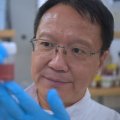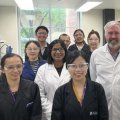Chronic pain relief, the employment aspirations of recently-arrived refugees, urban water use and improved animal production are among new research projects announced today in which The University of Queensland and industry partners will collaborate.
UQ attracted 18 grants valued at $6,352,239 in the latest round of Australian Research Council Linkage Project grants, announced today by Minister for Tertiary Education, Skills, Science and Research, Senator Chris Evans.
UQ received the highest amount of funding awarded by the Federal Government, and accomplished a 45 per cent success rate compared to the national average of 36.7 per cent.
Industry partners will contribute more than $12 million to the collaborative research projects starting at UQ this year.
UQ's Deputy Vice-Chancellor (Research) Professor Alan Lawson thanked the Federal Government and our research partners for their support and said UQ's strong connections with end-users ensured that its research continues to benefit society.
“Research and engagement are two of UQ’s three strategic priorities, and their integration in Linkage projects ensures UQ research is in close contact with current global challenges,” Professor Lawson said.
“The ARC Linkage Project grants announced today will support many important and exciting areas of research in partnership with key companies and collaborating organisations.”
The largest grant, valued at $1.575 million, was awarded to a three-year project led by Professor Maree Smith (UQ Centre for Integrated Preclinical Drug Development).
The project, in association with industry partner Boehringer Ingelheim International, seeks innovative methods for selecting novel compounds with high potential for development as drugs for improving the relief of chronic pain.
The research will develop technology that can be used in the development of new pain-killers that are highly effective without producing unpleasant side-effects.
Other Linkage Projects funded at UQ include:
• $164,830 to a project entitled: Pathways to and through palliative care: a sociological study of patient, carer and clinician experiences at the end-of-life — project leader Associate Professor Alex Broom (School of Social Science). Partner organisation: St Vincent's Hospital Brisbane, Mater Misericordiae Health Services Brisbane Ltd, Spiritus Care Services. Palliative care services provide care and support for families, carers and individuals trying to cope with the challenges presented at the end of life. This project will provide critical policy and practice-relevant data in order to improve our understanding of, and support for, the dying process in Australia.
• $255,000 to a project entitled: Heteronuclear parallel imaging and spectroscopy for magnetic resonance — led by Professor Stuart Crozier (School of Information Technology and Electrical Engineering). Partner organization: Bruker BioSpin MRI GmbH. This project will develop novel imaging technology for improved investigation of biological processes in living tissue. Successful outcomes of this project are expected to contribute significantly to biomedical research efforts, such as improved early detection and treatment of cancer and chronic disease.
• $175,869 to Constructing futures: an investigation of the aspirations of young adults with an intellectual disability and their parents — led by Associate Professor Monica Cuskelly (School of Education). Partner organisation: Endeavour Foundation. This project aims to develop a better understanding of the aspirations for adult life held by young adults with an intellectual disability and their parents. Organisations that provide services to this vulnerable group will use the results to examine current, and guide future, service provision.
• $150,000 to The development of automated advanced data analysis techniques for the detection of aberrant patterns of prescribing controlled drugs — led by Dr Marcus Gallagher (School of Information Technology and Electrical Engineering). Industry partner: Queensland Health. The state of the art in ICT for healthcare monitoring is rapidly advancing, however, the value of data depends on effective tools and techniques. This project will develop novel techniques for the detection of emerging patterns in the prescribing of controlled drugs, supporting Queensland Health’s role in patient harm minimisation.
• $498,000 for The tree legume Pongamia pinnata on coal mine spoil: an integrated and sustainable rehabilitation, bioenergy and carbon farming production system — led by Professor Peter Gresshoff (Centre for Integrative Legume Research). Partner organisations: Stanwell Corporation Ltd, Bioenergy Plantations Australia. This project aims to assess the growth performance of the tree legume Pongamia pinnata on coal mine overburden. The expected growth of Pongamia on what is regarded as poor quality soil will lead to the development of an integrated production system that will provide benefits through rehabilitation of lands, biofuel feedstock, and carbon farming.
• $177,805 to Enhancing outcomes for separated families by improving family mediation — Professor W. Kim Halford (School of Psychology). Industry partner: Relationships Australia (Queensland). More than 100,000 adults and 60,000 children experience family breakdown each year in Australia, which wreaks enormous personal, social, and economic costs. This project aims to develop more effective ways to mediate disputes over shared parenting after family breakdown.
• $123,235.00 to Refugees employment aspirations and inter-generational communication about future occupational pathways — led by Dr Aparna Hebbani, (School of Journalism and Communication). Partner: Access Community Services Ltd. This project is the first to investigate the long-term employment aspirations of recently arrived refugees and how they communicate them to their children. Findings will inform policy and service delivery aimed at helping these people to achieve the potential they bring to Australia.
• $529,000 to Evaluation of Bacillus amyloliquefaciens H57 as a probiotic in livestock using animal nutrition studies and metagenomics — led by Professor Phil Hugenholtz (School of Chemistry and Molecular Biosciences). Industry partner: Ridley Agri-products. To improve animal production, gene sequencing will unravel how microbial communities in the rumen of sheep and cattle and the gastro intestinal tract of poultry respond to feed quality and probiotic bacteria. The animal nutrition trials will also measure weight gain and feed utilisation efficiency, particularly for nitrogen, protein and energy.
• $282,500 to Fertility crisis: harnessing the genomic tension behind pollen fertility in sorghum — led by Associate Professor David Jordan (Queensland Alliance for Agriculture and Food Innovation). Partner organisations: Agri-Science Queensland, Nugrain Seeds Pty Ltd, USDA - Agricultural Research Service: Crop Germplasm Research. Hybrid sorghum varieties yield more grain than inbred varieties but the production seed for farmers can be difficult. This project will identify the genes responsible for a trait that makes hybrid seed production possible and this knowledge will help raise sorghum yields in Australian and in some of the world’s poorest countries.
• $480,000 for Development of high performance cathode materials for Lithium-ion batteries — led by Dr Denisa Jurcakova (Australian Institute for Bioengineering and Nanotechnology). Partner Organisation: Dow Chemical (Australia) Limited. This project will lead to a new family of cathode materials for Lithium-ion batteries with both high energy and power densities. The newly-developed energy storage system will be critically important for the efficient use of renewables in Australia's electricity grid and hybrid transportation industry.
• $350,000 for Water-energy-carbon linkages in households and cities: a new paradigm — led by Professor Paul Lant (School of Chemical Engineering). Industry partner: South East Water. This project quantifies water-related energy in households and cities. The project aims to find cost-effective solutions to the rapid increase in urban water energy use, and solutions for the co-management of water, energy and carbon.
• $505,000 for Harnessing the genome of the Australian paralysis tick to develop effective control products — led by Dr Alicja Lew-Tabor (Queensland Alliance for Agriculture and Food Innovation). Partner organisation: Eli Lilly Australia. This project aims to examine the potent cocktail produced by the salivary gland of Australia's paralysis tick. The paralysis tick continues to cause severe illness and deaths for companion pets with up to 100,000 cases of toxicoses per year. This project aims to develop new safe treatments and/or preventative vaccines
• $285,000 for Reconciling competing objectives for the design of marine reserve networks: biodiversity, food security, and local equity in benefits — led by Professor Peter Mumby (School of Biological Sciences). Partner organisations: USAID Coral Triangle Support Partnership, World Bank. This project uses a decision-theoretic framework to balance the often conflicting marine conservation objectives of preserving biodiversity and building food security for local communities in the socially and ecologically complex region of the Coral Triangle. A new reserve design will boost biodiversity conservation and better support livelihoods.
• $225,000 to The natural history of licit and illicit drug use in a population cohort of stimulant users — led by Professor Jake Najman (School of Population Health/Social Science). Partner organisation: Queensland Health. The simultaneous use of alcohol and stimulant drugs by young Australian adults is an emerging social and public health problem. This project provides urgently needed information about the causes and extent of this problem by studying patterns of drug use within a community sample of young adults over a five-year period.
• $105,000 to Improving the processing of low quality iron ores by the modification of particle interactions — led by Dr Yongjun Peng (School of Chemical Engineering). Partner Organisation: COREM. This project is aimed at modifying particle interactions to selectively stabilise or destabilise minerals during grinding and subsequent separation of low quality iron ores. The project will lead to improving grinding energy efficiency, increasing iron mineral production and reducing the impact of iron ore tailings on health and environment.
• $151,000 to The role of implicit identity and implicit beliefs in recovery from mental illness — led by Dr Courtney von Hippel (School of Psychology). Partner organisation: Aftercare. Although effective treatments have been developed for many mental disorders, some people still fail to recover when others with a similar psychological profile respond well to therapy. The proposed research addresses this conundrum by examining the role of unconscious identification with mental illnesses and the role it plays in recovery.
• $320,000 for In-situ electrochemical generation of caustic and oxygen from sewage for emission control in sewers — led by Professor Zhiguo Yuan (Advanced Water Management Centre). Partner Organisations: ACTEW Corporation Limited, Allconnex Water, District of Columbia Water and Sewer Authority, Queensland Urban Utilities, Yarra Valley Water. This project aims to deliver an innovative technology that controls the emission of notorious compounds from sewer networks using chemicals directly produced from sewage, with electricity being the input. Compared to existing methods, this technology provides a much safer and more environmentally friendly solution, at less than 50 per cent of the cost.
Media: Jan King UQ Communications 0413 601 248
.jpg)






